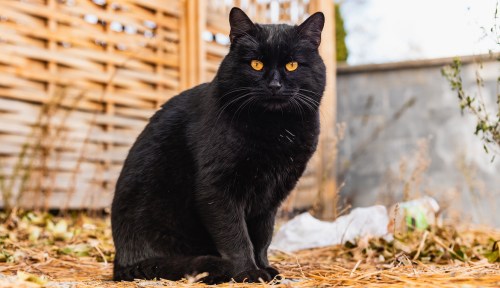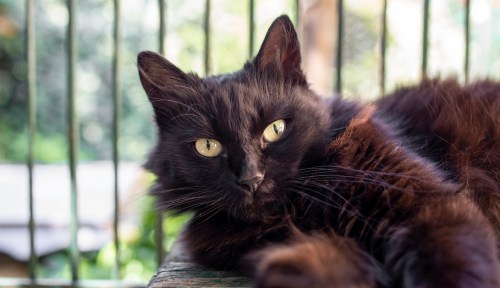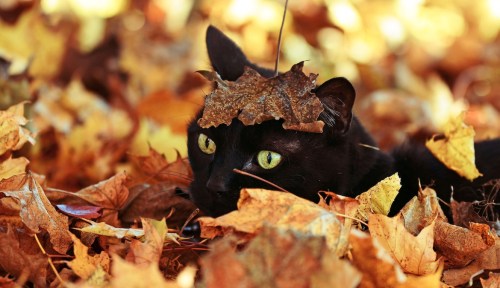The Actual (Not-So-Spooky) Meaning of Crossing Paths With a Black Cat
Superstition says black cats are bad luck, but the spiritual meaning of black cats points to good luck. See what black cats symbolize here.

How many times have you hopped over a crack to avoid breaking any of your relatives’ backs, been careful not to spill salt, or dodged a black cat to skirt around seven years of bad luck—did you ever stop to think about where some of those common superstitions actually come from? For black cats, the meaning traces back to centuries-old myths that may be doing the felines more harm than good in present day.
Experts in This Article
clairvoyant and spiritual coach
a Los Angeles-based trance medium and expert occultist
a channeler, intuitive, and breathwork specialist
Myths about animals and their relevance to our luck, abundance, and prosperity are prolific: Think about all the tales around spirits of loved ones or good luck visiting you in the form of cardinals, butterflies, fireflies, bluebirds, ladybugs and even horseshoes. And then there are the visits that are considered “spooky,” like bats and black cats. Stories about the meaning of black cats in particular have been present in folklore for centuries, going all the way back to Ancient Egypt, weaving through medieval Europe, and making their way to today. Black cats have also been represented in popular media about witchcraft, in everything from characters on the original TV series Bewitched to the feline companion in Hocus Pocus, to a common witchy omen in Practical Magic. That association is not an accident, and dates back to the Middle Ages in Europe, according to Janet Rae Orth, clairvoyant, intuitive, dream interpreter, and energy healer based in Tucson, Arizona. “In medieval times, many stories arose in folklore that a black cat was a witch in disguise,” Orth says.
But even though some portrayals of black cats connected to witchcraft and other spiritual practices have been commonly associated with evil, Satan, and general bad luck in Western culture, that’s not necessarily the black cat’s spiritual meaning. Experts in channeling, clairvoyance and the occult break down the black cat’s meaning and the myths and misunderstandings behind them.
What does a black cat symbolize?
Black cats didn’t always have the dark, eerie, Halloween-like symbolism in the ancient world. Actually, it was the opposite. “In Egypt, the black cat was revered as a symbol for wealth and prosperity on all levels: mental, spiritual, physical and emotional,” explains Mary Buckingham, channeler, intuitive, and breathwork specialist. Cats in ancient Egyptian culture also had an association with fertility partially thanks to Bastet, the deity of fertility and companion to the powerful goddess Isis. Bastet, along with the goddesses of justice and power, Mafdet and Sekhmet, were all considered felines and were depicted with the head of a cat, adds Kaitlyn Graña, a Los Angeles-based trance medium and expert occultist.
“In Islam, cats have been revered for centuries and thought to be ritually clean.” —Kaitlyn Graña, a Los Angeles-based trance medium and expert occultist.
Cats also symbolize cleanliness and protection against illnesses in some cultures. “In Islam, cats have been revered for centuries and thought to be ritually clean,” Graña says. Cats were also known to be present on Viking Voyages to catch any rodents that could be carrying diseases on ships and allegedly bring good luck for the weather, adds Graña (this eventually came into play again during the Bubonic Plague in medieval Europe).
However, some other narratives have perpetuated the myths that black cats carry bad omens or negative energy. Some common misconceptions are as follows:
Black cats bring bad or evil energy.
Black cats and cats in general had spiritual power in certain traditions (especially for ancient Egyptians and later Romans who conquered Egypt, and for Nordic explorers, or Vikings). Around the thirteenth century, that all changed, mostly because of certain institutions such as the Catholic Church. Ancient, pre-Christian cultures’ respect for cats might have triggered the church to associate cats, specifically dark-colored cats, to “devil worship” or the occult, since those traditions did not adhere to Christianity, suggests Graña. In the year 1233, Pope Gregory IX issued a document called “Vox in Rama.” This ended up formally linking cats to “dark,” non-Christian practices and incarnations of the Christian version of the Devil, explains Graña. And it worked.
Black cats are associated with witchcraft.
“Vox in Rama” linked black cats to “Devil worship” or “black magic” and therefore to witchcraft in European folklore, says Graña. That tricked people into associating the cats with negativity and fear, and that myth has persisted, adds Buckingham. The powerful imagery of black cats persisted into the fourteenth century, when the bubonic plague hit. “While European Catholics and Christians distrust in cats caused the felines to bear the blame for the plague, in truth the disease was carried and passed by mice and their fleas,” explains Graña. Fewer cats meant fewer ways to kill the rodents causing the plague. During that time, there were accusations of witchcraft against people who did have cats as pets, particularly women; they were thought to be “witches” because they were better able to escape the plague unharmed, says Graña.
Cats have always been domesticated pets.
Cats didn’t really exist as pets in what is now North and South America until European settler colonists arrived—they brought cats with them in order to control vermin, along with long-held superstitions about black cats with them, according to Graña. European Christianity seems to be the major source of the myths about black cats and panic around witchcraft, which later influenced historical events in the colonies such as the Salem Witch Trials.
Is a black cat good luck or bad luck?
In ancient cultures, including Egyptian, cats were linked to good luck, prosperity, and even safety and fertility, says Orth. That shifted around the thirteenth century, when the Catholic Church proclaimed that black cats were symbolic of Satan, witchcraft, and therefore “bad luck” for anyone who considered themselves Christian, she adds. Part of that idea was the Catholic Church and other Christian authorities’ desire to retain power in Europe and later in the European colonies.
Black cats, according to their original spiritual meaning, symbolize powerful supernatural abilities, says Buckingham. Spiritually, they are also associated with feminine energy—ancient Egyptian goddesses may play a role in that. Institutions such as the Catholic Church and other organized Christian religions have feared and attempted to squelch this energy for centuries, “for the means of controlling the powerful feminine energy that is the source of creation,” per Buckingham.
All in all, considering the potential spiritual power of cats and their association with wealth, prosperity, fertility, and protection dating back to ancient cultures, black cats have a meaning that is much closer to good luck than bad. There’s not much evidence in history to suggest that any kind of real “bad luck” follows black cats.

Do black cats struggle to get adopted?
Dating back to medieval Europe, black cats and black animals in general have had a bad reputation in Western culture because of the myths that associate them with witchcraft and “devil worship,” research explains1. This affects the adoption and treatment of black cats in general, due to the phenomenon that researchers call “black cat bias32.”
“If you see a black cat, they are letting you know that your luck is about to change.” —Janet Rae Orth, clairvoyant, intuitive, dream interpreter, and energy healer based in Tucson, Arizona
When investigating why this stigma persists, researchers in a 2020 study found that study participants had negative attitudes toward black and dark colored cats not necessarily because of racial bias or religious beliefs, but because of cultural superstitions. These superstitious beliefs have translated into real behaviors around the animals: In a study that tracked thousands of cats found in an urban Kentucky shelter throughout one year, black cats had only a 10% adoption rate and had the highest euthanasia rate of any type of cat, at 74.6%. Black cat bias persists, even in the twenty-first century.
What does it mean when a black cat visits you?
When a black cat visits you or runs by you, it’s not actually a bad omen but a sign of good luck. Again, this dates back to the goddess Bastet in ancient Egypt, explains Orth—she was said to protect the home from disease and safeguard fertility. “If you see a black cat, they are letting you know that your luck is about to change,” she says. The color black in general has been associated with death and darkness. But that’s not the whole story: With death comes renewal or rebirth, according to Orth. If you’re facing a time of hardship, seeing a black cat could mean that it’s a message that a positive renewal is coming. This could be financial prosperity, a return to good health, or a sign of fertility, if you’re trying to expand your family, Orth adds. You should embrace the good luck coming your way.
What to do if you see a black cat
The superstitious reaction to seeing a black cat, especially seeing a black cat at night, has typically been fear and panic as a result of the idea that seeing a black cat is a message from “the devil,” a witch, or some kind of dark spirit. The typical superstitious advice is to do a ritual in which you walk in a circle, then walk backwards across the spot where you crossed paths with the black cat, and then count to thirteen to “reverse” the bad luck.
Spiritual experts say that it’s not necessary to do any of that when you see a black cat. Instead, you should embrace the message it could be sending. “If a black cat crosses your path, pause and take a moment to go inward. During this moment, reflect on what you are struggling with, what you are hoping for, and what feels blocked in your life,” says Orth. “Receive the message of good luck and hope that the black cat is offering you.”
Orth also advises that you try not to panic or make sudden movements that might startle the cat. Like many animals, domesticated or otherwise, black cats, and any cats for that matter, appreciate having their space (and may enjoy the occasional treat if you get close enough to them). To focus in on the meaning of the black cat you see, Orth recommends taking a meditative moment to notice the cat’s dark coat, soft fur, and the sleekness and grace of their movements—try to listen with your intuition for the message the cat might be sending.
What does it mean if you dream about black cats?
Dream interpretation expert Orth emphasizes that the meaning of a black cat in a dream is different from seeing a black cat in waking hours. “When any cat appears in your dream, not just a black cat, this is a warning that there is treachery afoot,” says Orth. It’s not necessarily that the cat is sending bad energy, but it’s a sign that someone around you might not be trustworthy and you should be alert to that.
The message of a black cat in a dream should not be distorted—this is not supposed to be dark or scary, but a warning to pay attention to your inner circle and do some careful thinking about the people who are around you. “Black cats are messengers and we are wise to heed their warning in our dreams, or embrace their message of hope, renewal, fertility and prosperity in our waking hours,” says Orth.

What is black cat energy?
Black cat energy has become a popular social media trend, and the meaning is often associated with love and dating. TikTok creator @annakrstna has made dozens of videos urging women to be the “black cat” in a relationship or situationship (i.e. to be unbothered and not to chase, be too eager, or depend on another person, which is considered “golden retriever energy”).
One way black cat energy can be interpreted is celebrating and embodying feminine energy and your inner goddess, says Buckingham. It’s about knowing who you are and the power you hold, and being able to stand firm in that, whether you have a partner or not. However, the idea of black cat energy may not necessarily resonate with you, and this archetype of “black cat vs. golden retriever energy” could be problematic, warns Graña. “While there is some good fun in the imagery of ‘black cat women’ and ‘golden retriever men,’ what I’ve ultimately deduced from this trend is a repackaging of toxic gender roles that we see all over social media, like ‘tradwife,’ and ‘twin flames,’” they say. “In fact, much of the discourse around black cat and golden retriever dynamics is copy-pasted straight from the Twin Flames cult playbook, reinorcing the harmful idea that for a relationship to be worth it, one person should be a ‘runner’ and the other should ‘chase.’” As a dating trend, this can potentially lead to toxic relationships in which one person has control over another.
Final thoughts about black cats
Ultimately, unless they’re directly pitted against golden retrievers and their energy, black cats can bring good energy and good luck. “You can see from lore across the globe that cats are considered guardians from disease, harbingers of prosperity, and protectors of those traveling by sea,” says Graña. The best way to greet a black cat is not to run away, scare it, walk backwards, or count to thirteen. You can actually share a moment of gratitude for your stroke of good luck. “Thank them for their guardianship and good fortune, and let them be on their way,” Graña adds.
- Carini, Robert M et al. “Coat Color and Cat Outcomes in an Urban U.S. Shelter.” Animals : an open access journal from MDPI vol. 10,10 1720. 23 Sep. 2020, doi:10.3390/ani10101720↩︎
- Jones, Haylie D, and Christian L Hart. “Black Cat Bias: Prevalence and Predictors.” Psychological reports vol. 123,4 (2020): 1198-1206. doi:10.1177/0033294119844982↩︎
- Jones, Haylie D, and Christian L Hart. “Black Cat Bias: Prevalence and Predictors.” Psychological reports vol. 123,4 (2020): 1198-1206. doi:10.1177/0033294119844982↩︎
Sign Up for Our Daily Newsletter
Get all the latest in wellness, trends, food, fitness, beauty, and more delivered right to your inbox.
Got it, you've been added to our email list.








